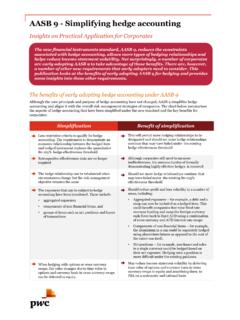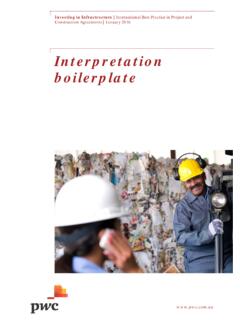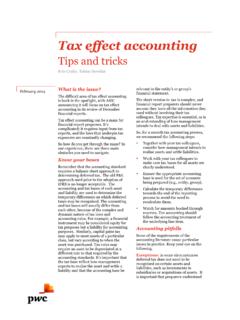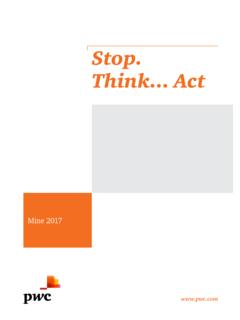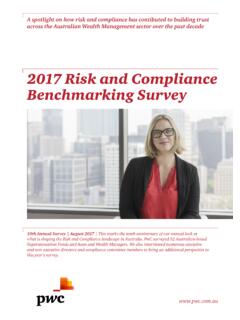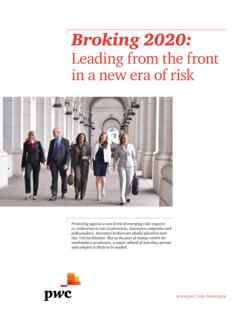Transcription of Disability expectations - Investing in a better life, a ...
1 Disability expectations Investing in a better life, a stronger Australia Achieving better outcomes for people with a Disability and their families November 2011. Foreword The National Disability Insurance Scheme (NDIS) was put forward by the Productivity Commission in its report Disability Care and Support, which was submitted to government on 31 July 2011 and publicly released by the Prime Minister on 10 August 2011. The NDIS proposes a way forward for Australia. PwC brought together an expert team with extensive experience in the Disability support system. The aim of the group has been to answer the question What is required to deliver the NDIS?
2 This paper provides a brief history of Disability in Australia and, as part of its focus, draws on international experience and comparisons. One of the most telling and challenging statistics is that Australia ranks 21st out of 29 OECD. countries in employment participation rates for those with a Disability . In addition, around 45% of those with a Disability in Australia are living either near or below the poverty line. These facts alone show us that we need to change. The paper explores the NDIS from different perspectives starting with the person with a Disability , then the family, then support organisations, and finally the government or National Disability Insurance Agency (NDIA).
3 The biggest challenge for Australia is to provide an environment for change which allows for a cultural shift across all parts of our society. Active participation of those with a Disability in society generally can only occur with a change in attitude. This is something that can't be legislated; people need to see the reason why change is important. I urge you to think about the four principles we have put forward in this paper: Fairness, Facilitation, Choice and Inclusion and ask whether there is anything you or your organisation can do to help bring about change. Improving the lives of those with a Disability is the responsibility of all Australians.
4 Chris Bennett Partner Government Sector Leader PwC. Disability expectations : Investing in a better life, a stronger Australia 3. Contents 08 11 14. Disability expectations : Introduction The story so far Investing in a better life, a stronger Australia Overview 16 22 29. The problem A 10-year horizon - An inclusive Principles for Disability Australia: What in Australia needs to change 54 60. What needs to be done? Disability thought leadership participants Disability expectations : Investing in a better life, a stronger Australia 7. Disability expectations : Investing in a better life, a stronger Australia Overview The imperative for changing the Disability Investment in change: experience in Australia is clear.
5 Change must Policy, system and culture occur at the broadest level for improvement to be seen at the level of the individual. The A fair go for all Australians National Disability Insurance Scheme (NDIS), Broader access to the economy and society has been at in parallel with strong policy, whole-of- best haphazard or at worst a near complete shut-out'1. government accountability, and culture change for many Australians living with a Disability . If we are committed to being a fair and decent Australia, we must are the keys to realise reform. The necessity to invest in real change, which gives power and dignity to act now and introduce an NDIS is undeniable the individual.
6 It is required for the economic safety and Change is necessary because Australia's overall security of Australia, it provides a fair go for performance in outcome and cultural terms for people all Australians. It is the right thing to do for the with a Disability , their families and carers has been poor. future wealth of Australia in both economic Policy promises of fairness and basic human rights have gone unfulfilled. Active pursuit of system and societal and social terms. change in combination with the NDIS is the most obvious Australia is the lucky country, where most Australians have and achievable way of: the opportunity to dream without limit.
7 Yet our largest providing an entitlement rather than welfare-based minority people with a Disability are not afforded the access for 410,000 Australians basic rights others take for granted, let alone the relative changing the cultural and material environment luxury of leading a good life. That is, approximately four million people living with a Disability in Australia are at risk explicitly changing the way mainstream and of or are currently being treated unfairly. This is explicitly specialist Disability services interact with people highlighted in the Productivity Commission's (PC) report. living with a Disability .
8 This should resonate with every Australian, because anyone could find themselves living with a Disability at some point in their lives. 1 A. ustralian Government. (2009). Shut Out: The experience of people with Disability and their families in Australia. National Disability Strategy Consultation Report. Prepared by the National People with Disabilities and Carer Council. 8 PwC. The economic safety and security In the international context, Australia has significant opportunity to improve in terms of Disability -related of Australia expenditure, employment performance and The population of Australia is ageing so, while there are relative poverty: currently five people of working age for every person aged An international comparison of Disability -related 65 and over, this number will almost halve ( ) by expenditure (to the extent that this is possible).
9 In the face of this dilemma, people of working age with indicates that, compared with other countries, Australia a Disability still face barriers to transport, employment, has a lower level of spending as a share of GDP on long- education and support, limiting their opportunity to term care for people under the age of 65. Expenditure contribute as productive members of society. is more than double in the Scandinavian countries of In 2009, approximately million3 Australians had a Denmark, Sweden and Norway, and slightly less than severe/profound core activity limitation. These million double in the United Kingdom when compared with people (and other people with a Disability ) were supported This is still the case when Disability income by approximately 772,0004 (calculated on an FTE basis) payments are included informal carers.
10 The current employment rate of people with disabilities in Australia is low against the OECD average. People In 2099, it is estimated that approximately 4 million5. with a Disability in Australia are only half (50%) as people will have a severe/profound core activity limitation in Australia more than triple the current number. likely to be employed as people without a However, the Australian population is estimated only to In comparison: double6 over this same time period; hence, it is likely that For the OECD, the relativity is 60%. the same amount of informal care will not be available in Considering the top eight OECD countries, the future to support people with disabilities.
